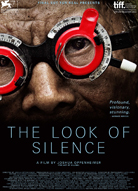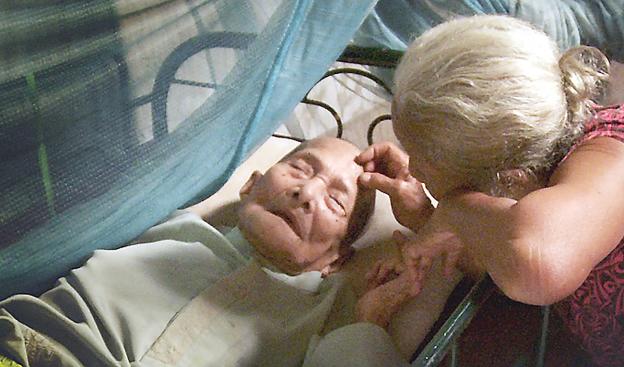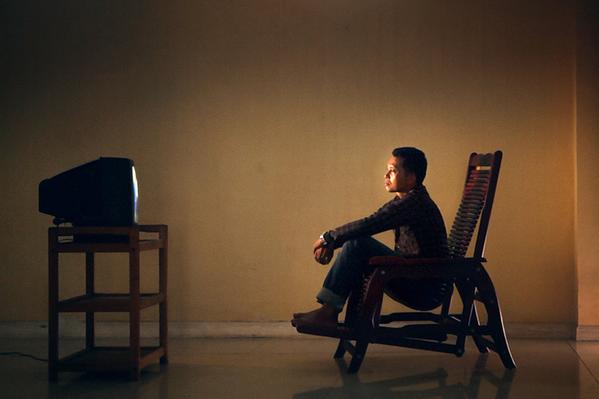The Look of Silence
 Friday, July 24, 2015 at 11:01AM
Friday, July 24, 2015 at 11:01AM Amir returns to his favorite 2014 festival film, newly arrived in theaters...
 Midway through The Look of Silence, Joshua Oppenheimer’s follow-up to the 2013 Best Documentary Nominee The Act of Killing, there is a seemingly innocuous moment that sends chills down the spine. The film’s protagonist, Adi, and a male companion are trudging through the forest as they discuss their assassinated family members. Slowly reciting the “Ashhad,” Muslim prayer for the departed, they arrive at a river that runs through the trees. The camera stops as they exit the frame. The forest’s natural humming and buzzing, and the slow movement of the water in dusk’s light lend the moment a haunting eeriness. The weight of their wounds lingers above the water; the emptiness of the space is terrifying.
Midway through The Look of Silence, Joshua Oppenheimer’s follow-up to the 2013 Best Documentary Nominee The Act of Killing, there is a seemingly innocuous moment that sends chills down the spine. The film’s protagonist, Adi, and a male companion are trudging through the forest as they discuss their assassinated family members. Slowly reciting the “Ashhad,” Muslim prayer for the departed, they arrive at a river that runs through the trees. The camera stops as they exit the frame. The forest’s natural humming and buzzing, and the slow movement of the water in dusk’s light lend the moment a haunting eeriness. The weight of their wounds lingers above the water; the emptiness of the space is terrifying.
This sequence is not unique to the structure of the film, a documentary whose emotional impact and, frequently, its thematic development, hinges on small, quiet moments; a shot of a motorcycle riding away toward the forests, a woman sitting still at the doorway of her house, a long gaze that captures the gravity of decades of history. Every miniscule gesture is effective, and the cumulative impact of these small wonders adds up to a film that is, without hyperbole, one of the best documentaries ever made.

In The Act of Killing, Oppenheimer told the story of the Indonesian genocide through the prism of politics. Focusing on the executioners who have lived as heroes for nearly five decades, the first film studied the repercussions of corruption, theocracy and abuse of power on a socio-political level. The emotional punch of the film was predicated on disbelief and disgust. That its antagonists could so nonchalantly recreate their past monstrosities and remain more or less unaffected by the experience was so shocking, so inhumane, it would have been nearly impossible to stomach the film had it not been presented as “re-creation.”
On the other hand, nothing in The Looking of Silence is shocking. In this companion piece, Oppenheimer turns the camera 180 degrees around, focusing his gaze on the victims of the genocide. All manner of theatricality thus give way to blunt truthfulness, to opening up about pains inflicted several decades ago and repressed ever since. Adi is our guide through the suppressed agony of his people. His brother, Ramli, was taken away and brutally killed, before Adi was even born. His parents are both still alive: his mother a somber old woman who claims Adi’s birth was her defence mechanism against the heartache of losing her other son; his father a frail man who has lost all physical and mental function. Blind, nearly deaf and unable to walk, he barely remembers Ramli at all.
The structure of The Look of Silence, much of it comprised of archival footage shot for the first film, rests on the confrontations between the families of the victims and those of the perpetrators. It’s a window into the collective psyche of a society that has tried to brush its pains under the rug; not to suture the wounds but hide them away from view. Such deeply entrenched suffering is difficult to convey on the screen, but through Oppenheimer’s lens, it has become openly visible, so much so that at times the confrontational style feels slightly unethical. Authenticity is achieved through spontaneity, but this is often at the expense of subjects who are unaware of the revelations they're going to face on camera. There is a perverse brilliance to the duality at play here; the audience is at once made to feel guilty about the intrusion of privacy, and relieved at the prospect of healing as the members of this society open up to each other.

Two sequences are particularly striking, in both Adi enters the home of others to tell them of the atrocities committed by the head of their family. In one, he confronts a woman in the presence of her father, and we learn that she had never heard of her father’s crimes before. The heavy awkwardness of the moment for the audience is no less than her shocked discomfort. In another, Adi similarly confronts a woman and her two sons about her departed husband’s murders. Too old and fragile to revisit the uncomfortable memories, she and her sons force Adi out of their home and the audience into deep thought. For the children of the exectioners, and for us, the moral dilemma lies in the uneasy reconciliation of present and past.
For Adi, the only source of serenity is the continued search for justice, but his grief remains everpresent. Oppenheimer's subdued but polished style effectively conveys this sense of inescapability in a country where politics has seeped into every pore. The weight of history is crushing, and its haunting shadow is cast over every frame.



Reader Comments (3)
Thanks so much for this review. It's so beautify written. I had hoped to catch the screening they did of this, hosted by Louis Theroux but it was all sold out unfortunately. I'm desperate to see it, especially after seeing The Act of Killing. Thanks again, excellent review.
I still think about the end of The Act of Killing often, and not sure if I want to watch this.
I'm an Indonesian, and I shamefully haven't seen this movie and its predecessor.
Even worse, most of Indonesia citizens nowadays tend to look the other way and completely forget this horrible massacre.